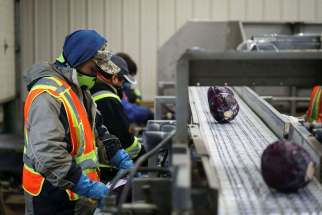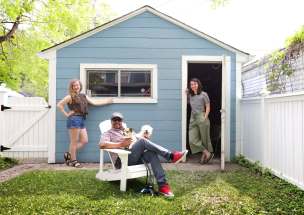Don’t bet on clueless when it comes to helping homeless
Read this article for free:
or
Already have an account? Log in here »
To continue reading, please subscribe:
Monthly Digital Subscription
$0 for the first 4 weeks*
- Enjoy unlimited reading on winnipegfreepress.com
- Read the E-Edition, our digital replica newspaper
- Access News Break, our award-winning app
- Play interactive puzzles
*No charge for 4 weeks then price increases to the regular rate of $19.00 plus GST every four weeks. Offer available to new and qualified returning subscribers only. Cancel any time.
Monthly Digital Subscription
$4.75/week*
- Enjoy unlimited reading on winnipegfreepress.com
- Read the E-Edition, our digital replica newspaper
- Access News Break, our award-winning app
- Play interactive puzzles
*Billed as $19 plus GST every four weeks. Cancel any time.
To continue reading, please subscribe:
Add Free Press access to your Brandon Sun subscription for only an additional
$1 for the first 4 weeks*
*Your next subscription payment will increase by $1.00 and you will be charged $16.99 plus GST for four weeks. After four weeks, your payment will increase to $23.99 plus GST every four weeks.
Read unlimited articles for free today:
or
Already have an account? Log in here »
Hey there, time traveller!
This article was published 04/06/2020 (2019 days ago), so information in it may no longer be current.
One of the demands was surprising. The other was no surprise at all.
This week, in a somewhat surprising move, the Manitoba Metis Federation threatened the City of Winnipeg with legal action unless it dismantled a homeless encampment on Henry Avenue near the MMF’s Exchange District headquarters.
In a letter to Mayor Brian Bowman, MMF President David Chartrand says that while his organization directly supports social programs to address homelessness, the camp has proven to be a threat to both safety and public health for staff and for Métis people trying to visit the offices.
Less surprising was the involvement of North Kildonan Coun. Jeff Browaty, a suburban populist with an exaggerated and unhealthy interest in downtown issues. Browaty was the main instigator in the creation of the referendum that successfully shattered the wishes of downtown residents to open Portage and Main to pedestrian traffic.
Apparently alarmed at what he saw commuting over the Disraeli Freeway each day, Browaty issued a news release demanding the city remove the “illegal homeless encampment” post-haste.
One year ago, the city abandoned a plan to hire a contractor to dismantle camps after objections were raised by advocates for the homeless. The plan going forward was to use city crews to control garbage and public health problems while the agencies attempted to divert the residents of the camps to other shelter options.
Based on the growth we have seen in the Henry Avenue encampment, those efforts have not been successful. In his release, Browaty said believes the Main Street Project has opened up enough additional shelter beds “to the point where there is no reason people need to live in these encampments.”
While Browaty’s rant is lamentably predictable, the MMF’s response is surprising in its uncharacteristic short-sightedness.
The MMF is not exaggerating its concerns about the camp. Still, as an entity that directly funds and provides its own array of social services, Chartrand must know that dismantling it does not solve the problem. Experience in cities all over the world is clear: when you dismantle one camp, another pops up somewhere nearby.
Chartrand also knows that addressing homelessness involves the slow and iterative process of convincing camp residents to accept an entirely different lifestyle. Many see them as better alternatives to the shelter system. Those battling mental-health and addictions need to deal with those underlying problems first before they can stabilize their housing situation.
This has been the experience in places such as Edmonton, where a decade-long effort involving police, social services and health officials has helped reduce homelessness by more than 40 per cent. Although Edmonton has, at times, moved aggressively to dismantle encampments, it has also established a homelessness command centre that tries to divert people before they become settled in temporary camps.
It should also be noted that, led in large part by Main Street Project, Winnipeg has made huge strides in addressing homelessness in the last year.
Thanks to support from all levels of government, the agency has been able to open a large emergency shelter in a vacant building at 190 Disraeli, which was temporarily donated to the organization. It can shelter up to 250 people and currently has about 175 people, on average, each night.
Addressing homelessness involves the slow and iterative process of convincing camp residents to accept an entirely different lifestyle.
Another temporary isolation shelter was opened up on Sargent Avenue specifically to help homeless people who were isolating and awaiting COVID-19 tests, or who had contracted the virus and needed to isolate until they recovered. About three dozen people can be sheltered there.
And finally, a new shelter and community health centre will open at the former Mitchell Fabrics building on Main Street at Logan Avenue, which MSP purchased in 2018. That will create space for an additional 120 people.
This is real progress, although at present, all the beds in the Disraeli Freeway and Sargent Avenue buildings are temporary. Once the threat of the pandemic has eased, it’s likely that those facilities will disappear.
After abandoning plans to hire an outside contractor to level the camps, Bowman and city officials have been annoyingly quiet about plans to deal with the encampments. Although it was a positive move to take a more patient approach, someone needs to provide details of exactly what that entails.
When it comes to homelessness, hardly anyone knows what a truly effective solution looks like. Our current approach is just a patchwork of well-meaning initiatives that function more as a Band-Aid, rather than a cure. Even so, demanding the encampment be dismantled without some sort of master strategy is flat-out irresponsible.
In an email exchange, Browaty said although he issued a news release on the encampment, he “never alluded to being an expert on dealing with homelessness.”
In that response, you will find a perfect example of why, despite the best efforts of some very smart people, homelessness is stubborn. Advocates for the homeless not only have to battle underlying problems of poverty, mental health and addictions, they also have to wade through the rantings of people who, by their own admission, don’t really understand the issue.
If history has shown us anything, the city will eventually dismantle the encampment on Henry Avenue and it will spring up somewhere else. If there’s any justice, those displaced residents will find a new home along the manicured green space that lines the Chief Peguis Trail in Browaty’s ward.
dan.lett@freepress.mb.ca

Born and raised in and around Toronto, Dan Lett came to Winnipeg in 1986, less than a year out of journalism school with a lifelong dream to be a newspaper reporter.
Our newsroom depends on a growing audience of readers to power our journalism. If you are not a paid reader, please consider becoming a subscriber.
Our newsroom depends on its audience of readers to power our journalism. Thank you for your support.
History
Updated on Friday, June 5, 2020 10:19 AM CDT: Corrects grammatical error





